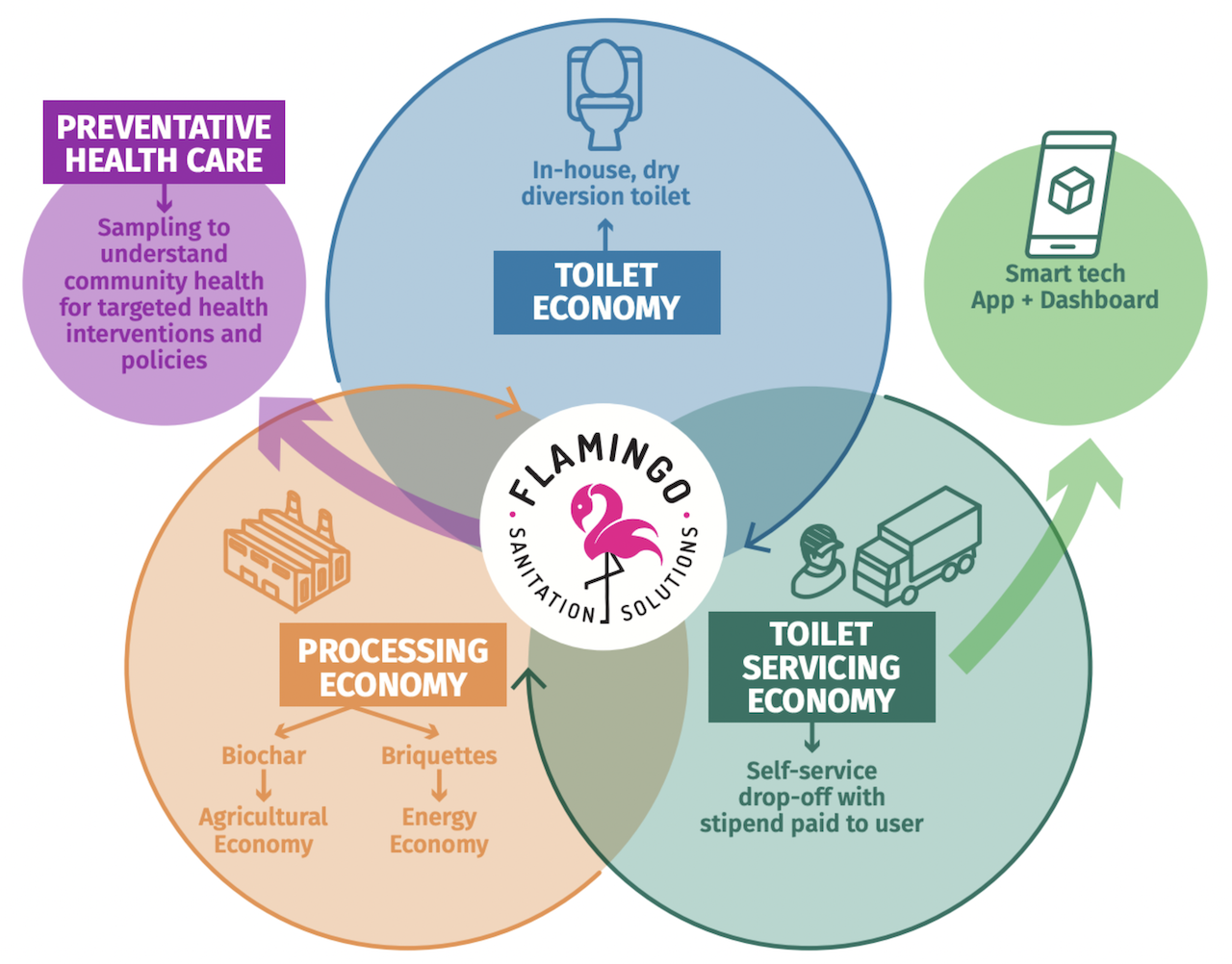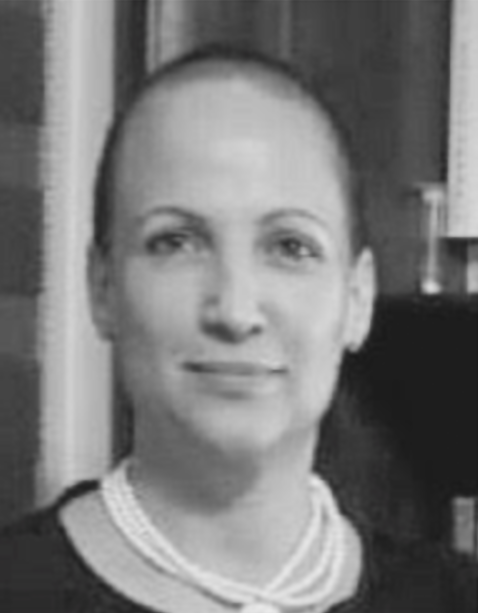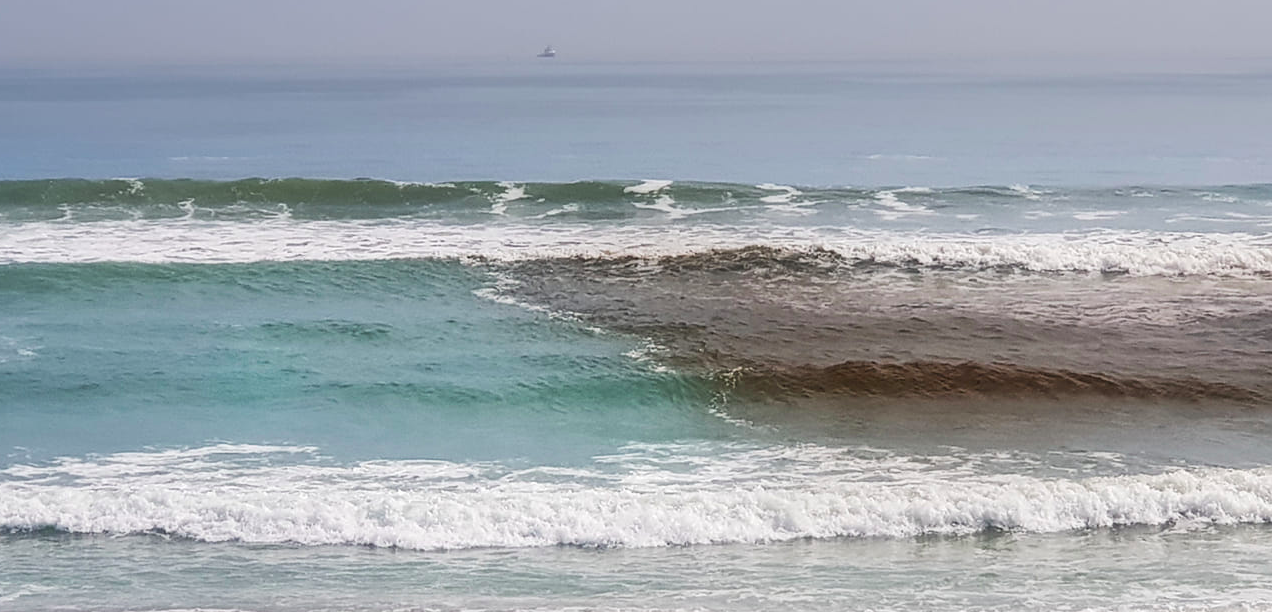A DIRE SANITATION CRISIS
Across South Africa we are facing a dire sanitation crisis that is affecting the nation’s rivers, lagoons, wetlands, and oceans as well as the citizen’s health, with children and adults alike being exposed to dangerous raw sewage on a regular basis. The origin of the problem is two-fold, namely crumbling infrastructure in most municipalities and the exponential growth in people settling in informal settlements that are not serviced.
South Africa is a water-scarce country. Many provinces have experienced crippling droughts with taps running dry in various municipalities. The most well-known case was when Cape Town was facing “Day Zero”, the day on which the last useable drop of water would come out of the taps. In this environment and with the certainty that climate change will increasingly place pressure on our already scarce water resources, it is time for South Africa to make a shift away from water-based sanitation to dry sanitation solutions.
click images to enlarge

TOILETS – The Flamingo Loo




African Stool – Toilet Design Inspiration
Why dry toilets?
Dry toilets have traditionally been a difficult proposition for South Africans to accept, especially as all affluent areas are serviced by water-based, piped sanitation and so this is not only the norm but aspiration. At FSS we believe that an opportunity exists to successfully introduce dry toilets in the community, as we are focusing on small units that could fit into homes, that are clean and non-odorous and that will benefit from being serviced in a dignified manner.
We will first and foremost test the hypothesis that dry toilets in homes can be accepted by people in informal settlements. Receiving a service on a regular basis should be a strong motivator. The fact that women and girls feel safer in their homes and as a rule don’t use chemical toilets distant from their homes should be another motivator to try out a Flamingo Loo. Another draw card will be that the community members will be recruited to service the toilets with the expressed ambition to pay salaries above government stipulated minimum wage.
The project has immense potential to scale – to other areas of Cape Town, the province, and the country. We hope that you will be interested in becoming part of South Africa’s service delivery solution that is community-based in approach and yet shows potential for job creation and ultimately a profit-making business.
During the pilot phase expertise and funding will be sought for the next phase of the project, namely turning human waste into biochar, fertiliser and insect protein.
Servicing – Pilot phase in Joe Slovo Park & Milnerton 2023
Although the problem described is being experienced across the country, the Milnerton community and lagoon do present us with a relatively contained area to use as a case study to test our assumptions, understand communities’ needs better and measure the potential and criteria for success. As we are moving into summer, we can expect that dumped waste will once again get stuck in the stormwater pipes and remain stagnant in the community and lagoon. Without rain there will be little shifting of waste out towards the ocean.
click images to enlarge
Processing

Winners of the 2022
Craft & Design Institute’s RE:SOLVE Challenge
A purpose-led innovation challenge to rethink the water and sanitation crises in South Africa funded by the City of Cape Town.
ABOUT US
Flamingo Sanitation Solutions was started by local residents in the Milnerton area in Western Cape to address the dire sanitation and pollution issues with raw human waste spilling out into the homes, streets, rivers, lagoons and oceans. Affecting not only the ground water and environment, but also severely impacting residents’ health and quality of life.
Who We Are

Talitha Bertelsmann-Scott
Founder
Flamingo Sanitation Solutions was started by Talitha Bertelsmann-Scott, a resident of Milnerton, during the COVID lockdown period. Talitha is a well-recognised researcher and monitoring and evaluation expert, both in the field of international trade policy and aid projects. She most recently held the position of Programme Head of the Economic Diplomacy Programme and the Regional Futures Observatory at the South African Institute of International Affairs (SAIIA).
She has published in many books, in journals, research papers and donor reports and has spoken at several international conferences, including at the Think Tank20 meetings that form part of the G20 process. Through more than twenty years experience of observing what works and what does not work she has developed the ambition to work closer to the ground and to be part of the solutions South Africa is seeking, rather than commenting and developing policy for governments in Africa that take a long time to show results. She holds an MA in Political Science and an MPhil in Economic Policy.
Talitha is an avid reader and recently found empirical evidence that cats are by far the best therapy for lock-down blues.

Selma Schwartz-Clausen
Director
Selma Schwartz-Clausen’s experience lies in the maritime sector. Areas of expertise include maritime sector development, port management, strategy development and execution, operations management, project management, regulatory port pricing and port efficiencies. She is considered an expert and sought-after logistician.
Selma’s qualifications include amongst others, the Port Cargo Transport & Port Environment Conservation for African Countries Programme in Japan. Further qualifications include an M + 2 from the University of Johannesburg, and M+4 from Peninsula Technikon, SMDP (NQF7), PGDip BMA (NQF8) and MBA (NQF9) respectively at the University of Stellenbosch (USB).
Selma chaired several industry platforms including the Cape Town Ship Repair Forum, WISTA (Women’s International Shipping and Trading Association) Western Cape delivering on WISTA’s goals and objectives, and moderator to the African Ports and Harbours Conference amongst a few. She represented Transnet and played an integral part in establishing the Oil & Gas Task team with the objective of harnessing the collective strength of the Western Cape Ports offerings in respect of servicing West Africa upstream activities. She served as a member Cape Chamber of Commerce Exporter of the Year judging panellists and thereafter as the Chairperson. She also serves on several NPO Committees.
When not juggling cargo containers entering and leaving the Cape Town Port, Selma is an avid hiker and can be found in the mountains surrounding Cape Town on most Sundays.

Melanie Holderness
Director
Melanie has been a practising advocate and member of the Cape Bar since 2004. She completed several terms as an acting judge of the High Court of South Africa, Western Cape Division, and has extensive experience in general commercial and matrimonial litigation. Melanie obtained her BA.LLB degrees from Rhodes University in 1996 and 1998. She completed articles at Buchanan Boyes Attorneys (now STBB) in 1999, and stayed on as an Associate in 2000. Melanie is finalising her accreditation with FAMAC (Family Mediators’ Association of the Cape). She is an arbitrator and serves on the panel of AFSA and the Commercial Property Tribunal.
In 2002, Melanie graduated with an MBA from the UCT Graduate School of Business. After a volunteering stint at the Red Cross Children’s Hospital, she worked as an Operations and Strategy consultant at KPMG Consulting in Johannesburg. This career change gave her valuable insight into the corporate world, and afforded her to opportunity to obtain diverse work experience. Melanie is passionate about social justice and animal rights. She is currently on the board of the Cape of Good Hope SPCA.
Melanie only added one dog, two kittens and two needy fancy rats to her family zoo during lock-down, an admirable achievement.
Her favourite pastimes are reading, hanging with her family, trail running and surfing with her daughter. She is slowly learning isiXhosa and loving every minute.

Claire Conroy
Director
With almost 16 years in the ever-changing media and communication industries, Claire has worked across various sectors and disciplines: from traditional to digital agencies as well as commercial businesses, NGO’s & start-ups.
Claire graduated from Natal University in 1997 with a Soc. Sci. degree in Marketing & Economics, and then got a bursary to Red & Yellow School to complete a post-grad diploma in Marketing & Advertising Management.
After working in advertising for almost a decade Claire joined a Shuttleworth Foundation funded project to start up a youth-led content agency – empowering and mentoring young South Africans under professional guidance. The model was developed to maximize both commercial and funded projects, whilst delivering on key social impacts. Claire worked in securing funding and delivering mandates for global and local funders and partners including The Rockefeller Foundation, Google, The British Council, SAB Foundation, The Reach Trust, eNCA, Parliamentary Monitoring Group, Metropolitan, StayFree and Red Bull.
Claire considers herself a socially minded entrepreneur with a business mind and a soothing addiction to Sudoku.
Get Involved

Give 25 Families a Toilet
Make your donation on our fundraising page:
Join us
To be part of our pilot phase testing the toilets in Joe Slovo Park or to get involved with our sanitary products to donate to the residents of Joe Slovo Park, please contact us.










